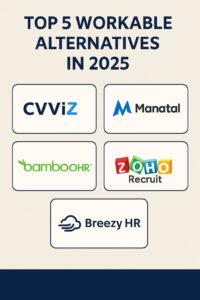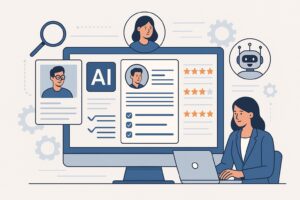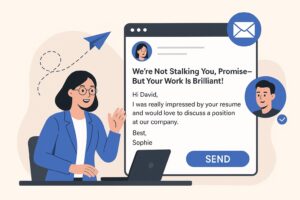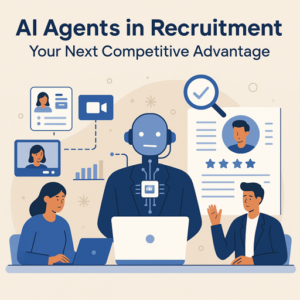What if the next big idea at your company is sitting in the resume pile you’re too busy to read?
Imagine you are planning to start a mid-sized company. You have studied the market and created a ground-breaking product. Now time is of the essence and you need to assemble a dream team— FAST.
Traditionally, this would have involved months of job postings, resume screenings, and endless interviews. To avoid the hassle, you decided to try an AI-driven recruitment platform. This AI Recruitment Software became your company’s guiding light and helped you predict top talent quickly.
It analyzed the candidates’ career trajectories for growth patterns and even assessed video interviews for emotional intelligence and cultural fit. It further helped the hiring managers design a tailored onboarding plan. The AI didn’t stop there. It also came up with the tools that will further enhance the team’s overall productivity.
As a result, you entered the market fast and became a success story within months.

In 2025, companies of all sizes are looking to adopt AI-driven recruitment tools to some extent to streamline and speed up their hiring processes, improve overall talent acquisition strategies, and enhance candidate experiences.
In today’s article, we will explore the latest trends in AI for recruitment and how AI is shaping the way candidates will be hired in the year 2025 and beyond.
Latest trends in AI for Recruitment
A study by Forbes found that 87% of senior executives believe that AI is important to achieving overall business objectives.
Another survey by LinkedIn found that 67% of hiring managers and recruiters found AI to be time-saving and efficient.
Even though the depth of AI usage in recruitment varies significantly from company to company, the majority of organizations are leveraging AI to speed up their hiring process, streamline recruitment tasks, increase team productivity, and ensure smooth candidate onboarding.
1. AI Utilization in Candidate Sourcing
In 2025, AI will transform candidate sourcing with enhanced efficiency and inclusivity. Advanced algorithms analyze platforms like LinkedIn, GitHub, and niche job boards to identify passive candidates, while predictive analytics optimize outreach by gauging job-switch likelihood.
AI-powered tools personalize engagement and anonymize profiles to reduce bias, fostering diversity in hiring. These innovations enable faster hiring and better talent quality giving them a competitive edge in the talent market.
2. AI-Driven Screening and Assessment
According to a study by Korn Ferry, 45% of HR professionals found that integrating cultural values is key to talent attraction in 2025.
Using advanced algorithms, companies can utilize AI for screening resumes, cover letters, and application forms. It can further identify potential candidates based on predefined criteria such as skills, experience, qualifications, and business domains they worked in.
AI recruitment tools further eliminate the human factor from the whole screening process and can conduct unbiased analysis through video interviews. They evaluate competencies like communication and problem-solving by scrutinizing speech patterns and facial cues.
This helps companies find the right candidate in the shortest time. It further increases the efficiency of the hiring process, saving costs, and enhancing the retention rate.
3. Enhancement of Candidate Experience through AI
AI-driven chatbots, interview scheduling tools, and personalized communication tools enhance the candidate experience by keeping them up to date. This leads to higher satisfaction rates, ensuring that the company establishes a life-long relationship with the candidates even though they are not hired in the given cycle.
This opens a goldmine of the carefully curated talent pool of top potential candidates that can be utilized by companies to fulfil future hiring needs.
AI Recruitment In 2025 – Key Aspects You Want To Consider
Now that you have understood the recruitment trends, it is time to delve deeper into how AI is going to be a must part of the recruitment strategy of every company.
1. The Cost of Falling Behind in Tech Adoption
According to a Visier study, 86% of recruiters report that AI-driven tools enhance efficiency. It further noted that it reduced time-to-hire by as much as 70% in some cases.
In today’s fast-paced business environment, staying competitive means embracing the latest technological advancements, especially in recruitment.
Companies that fail to adopt cutting-edge technologies risk falling behind their competitors in attracting and retaining top talent. Without the efficiency and precision of tech-driven solutions, companies may face prolonged hiring cycles, higher operational costs, and a diminished candidate experience.
The inability to keep up with tech trends would not only affect your immediate recruitment outcomes but also undermine long-term growth, innovation, and organizational reputation.
2. Candidate Expectations: The Demand for Efficiency
In a competitive job market, candidates have slowly become irritable with lengthy and inefficient recruitment processes. With numerous opportunities, skilled professionals expect companies to move quickly and decisively.
With prolonged recruitment cycles, companies not only test a candidate’s patience but also risk losing them to competitors who can offer faster decision-making and onboarding. Today’s candidates value streamlined communication, timely updates, and an overall seamless experience that reflects an organization’s efficiency.
Employers who fail to meet these expectations risk damaging their employer brand, making it harder to attract and retain top talent in the long run.
3. Navigating the Job-Hopping Era with AI
Job hopping has become the latest trend in today’s workforce. Today, candidates have little patience toward anything remotely negative in their work. They are frequently moving between roles in search of better opportunities, work-life balance, or personal growth.
This trend has made employee retention a critical challenge for companies. Retaining talent now hinges on finding candidates who align closely with the organization’s goals, culture, and vision. AI plays a pivotal role in achieving this by screening candidate profiles, past experiences, and behavioral traits to predict long-term compatibility with the company.
By using AI-driven insights during the hiring process, businesses can identify individuals who not only possess the right skills but also share the organization’s values, increasing the likelihood of long-term retention and relationships with the companies.
4. Humanizing Recruitment by Redefining Roles
AI in recruitment is transforming the entire hiring landscape by shifting the focus from repetitive tasks to relationship building.
Using recruitment automation in activities such as resume screening, interview scheduling, and initial candidate assessments, AI frees up valuable time for HR professionals to focus on relationship building and team collaboration. This reallocation of effort allows recruiters to engage with candidates on a deeper level, fostering trust, understanding their aspirations, and ensuring cultural alignment.
Instead of being bogged down by administrative work, recruiters can concentrate on strategic initiatives, making the recruitment process more personalized.
5. Diversity and Productivity: A Win-Win with AI
Diverse teams bring varied perspectives, innovative ideas, and a broader range of skills driving higher productivity and better problem-solving. Studies consistently show that inclusive workplaces outperform their counterparts by fostering creativity and collaboration.
However, achieving diversity can be challenging due to unconscious biases and limited reach in traditional hiring methods. AI addresses this by analyzing a broader pool of candidates and removing identifiers like gender, ethnicity, or age during the screening process.
By focusing solely on qualifications and skills, AI helps organizations build teams that reflect true diversity, enhancing overall performance while creating a more equitable workplace.
As the demand for efficiency, inclusivity, and agility in recruitment continues to grow, AI has emerged as a transformative force reshaping how organizations attract and retain talent. By streamlining processes, eliminating biases, and enhancing candidate experiences, AI not only accelerates hiring but also fosters long-term organizational success.
As we move further into 2025 and beyond, the integration of AI into recruitment strategies will no longer be optional—it will be a vital component for companies aiming to remain competitive in an ever-evolving job market. The question isn’t whether to adopt AI in recruitment, but how quickly you can harness its potential to drive meaningful change.




